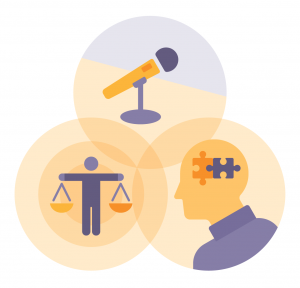Chapter 1: Professional Business Communication
7 Your Responsibilities as a Communicator
Four Tips for Communication
Whenever you speak or write in a business environment, you have certain responsibilities to your audience, your employer, and your profession. Your audience comes to you with an inherent set of expectations that is your responsibility to fulfill. The specific expectations may change given the context or environment, but two central ideas will remain: be prepared, and be ethical.
Preparation
Being prepared means that you have selected a topic appropriate to your audience, gathered enough information to cover the topic well, put your information into a logical sequence, and considered how best to present it.
Organization
Being organized involves the steps or points that lead your communication to a conclusion. Once you’ve invested time in researching your topic, you will want to narrow your focus to a few key points and consider how you’ll present them. You also need to consider how to link your main points together for your audience so they can follow your message from point to point.
Clarity
You need to have a clear idea in your mind of what you want to say before you can say it clearly to someone else. It involves considering your audience, as you will want to choose words and phrases they understand and avoid jargon or slang that may be unfamiliar to them. Clarity also involves presentation and appropriate use of technology.
Punctuality
Concise means to be brief and to the point. In most business communications you are expected to ‘get down to business’ right away. Being prepared includes being able to state your points clearly and support them with trustworthy evidence in a relatively straightforward, linear way.
Be concise in your choice of words, organization, and even visual aids. Being concise also involves being sensitive to time constraints. Be prepared to be punctual and adhere to deadlines or time limits.
Some cultures also have a less strict interpretation of time schedules and punctuality. While it is important to recognize that different cultures have different expectations, the general rule holds true that good business communication does not waste words or time.
Ethics in Communication

Communicating ethically involves being egalitarian, respectful, and trustworthy—overall, practising the “golden rule” of treating your audience the way you would want to be treated.
Communication can move communities, influence cultures, and change history. It can motivate people to take stand, consider an argument, or purchase a product. The degree to which you consider both the common good and fundamental principles you hold to be true when crafting your message directly relates to how your message will affect others.
The Ethical Communicator Is Egalitarian
The word “egalitarian” comes from the root “equal.” To be egalitarian is to believe in basic equality: that all people should share equally in the benefits and burdens of a society. It means that everyone is entitled to the same respect, expectations, access to information, and rewards of participation in a group.
To communicate in an egalitarian manner, speak and write in a way that is comprehensible and relevant to all your listeners or readers, not just those who are ‘like you’ in terms of age, gender, race or ethnicity, or other characteristics. In business, an effective communicator seeks to unify the audience by using ideas and language that are appropriate for all the message’s readers or listeners.
The Ethical Communicator Is Respectful
People are influenced by emotions as well as logic. The ethical communicator will be passionate and enthusiastic without being disrespectful. Losing one’s temper and being abusive are generally regarded as showing a lack of professionalism (and could even involve legal consequences for you or your employer). When you disagree strongly with a coworker, feel deeply annoyed with a difficult customer, or find serious fault with a competitor’s product, it is important to express such sentiments respectfully.
The Ethical Communicator Is Trustworthy
Trust is a key component in communication, and this is especially true in business. Your goal as a communicator is to build a healthy relationship with your audience, and to do that you must show them how they can trust you and why the information you are about to share with them is believable.
Your audience will expect that what you say is the truth as you understand it. This means that you have not intentionally omitted, deleted, or taken information out of context simply to prove your points. They will listen to what you say and how you say it, but also to what you don’t say or do. Being worthy of trust is something you earn with an audience. Many wise people have observed that trust is hard to build but easy to lose.
The “Golden Rule”
When in doubt, remember the “golden rule,” which is to treat others the way you would like to be treated. In all its many forms, the golden rule incorporates human kindness, cooperation, and reciprocity across cultures, languages, backgrounds, and interests. Regardless of where you travel, with whom you communicate or what your audience is like, remember how you would feel if you were on the receiving end of your communication and act accordingly.

